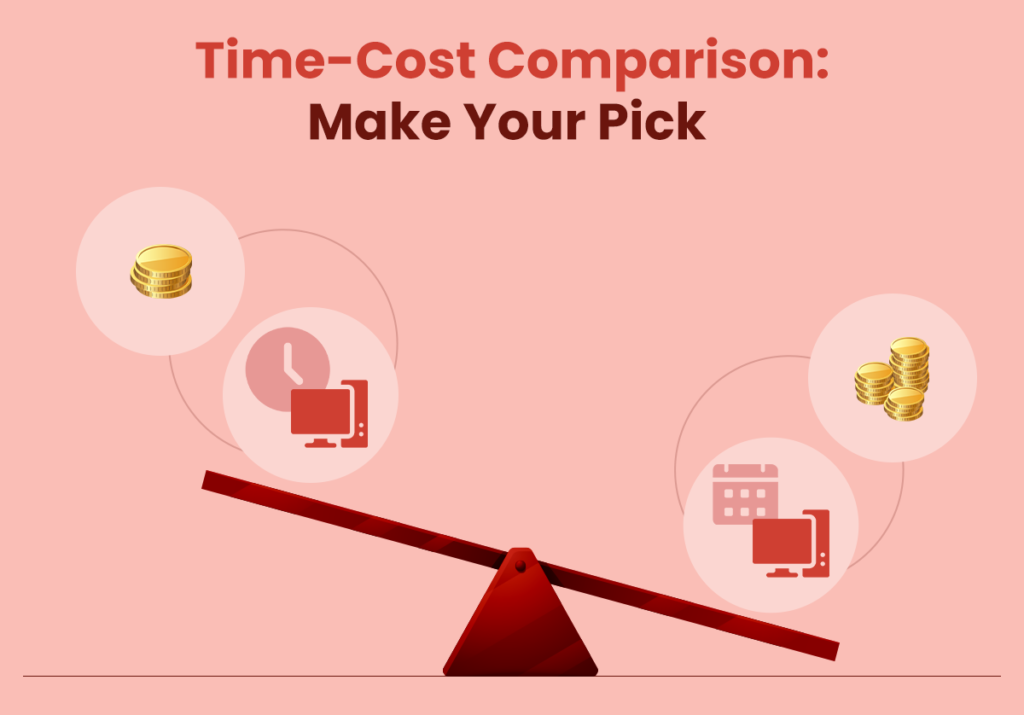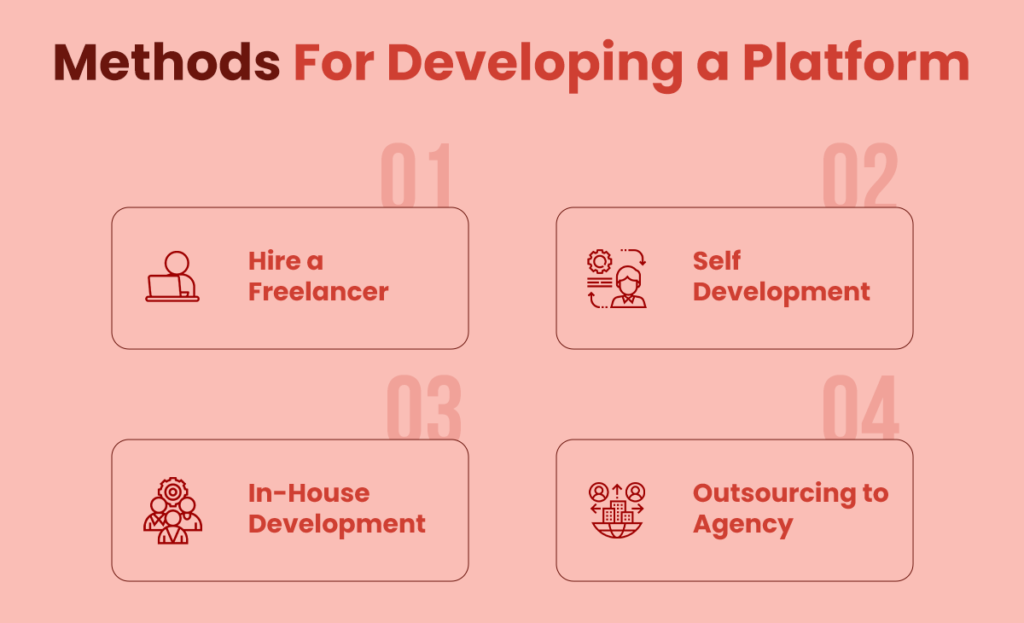In the present time, people are shifting towards the online world, as everything is just a click away and is available at one’s fingertip. Moreover, people have become habitual to this lifestyle, as it is easier and faster. Keeping in mind what people prefer, businesses are undergoing digital transformation and are shifting to platforms like mobile apps, websites, and web apps to reach globally.
However, businesses often find it challenging to choose a platform while going online. Every platform has its own pros and cons. If industry ‘A’ is benefitting from a website, then it’s not necessary that industry ‘B’ will also be in profit. It highly depends on the type of industry, business goals, and the target audience.
Therefore, to find out which technology is ideal for which business, let’s start by clarifying the concepts of Websites, Mobile Apps, and Web Apps.
Types of Digital Platforms
Website
With the Internet advancing worldwide, we see websites for all kinds of services and purposes. Websites have become an initial stage to take the business online and attract customers.
A website basically helps you to convey information regarding your business and increase its market presence. This makes websites useful in terms of promoting a brand to a wider audience.
Moreover, a business can enhance what the website offers by integrating several features like testimonials, company brief, contact information, etc therefore giving an identity to your brand. It helps in converting visitors into potential customers.
Now, we are pretty sure that you have got an idea of how exactly a website helps your business.
Let us dive into another platform, i.e., Mobile Application
Mobile Application
We use mobile phones while studying, at work, at home, on the street, in fact everywhere we go. An average person spends 88% of their mobile screen time using apps. This clearly shows that investing in mobile app development is a highly profitable business idea.
However, for businesses to get the most out of this opportunity, it is important to understand the different app development approaches and find which one is suitable for their brand.
There are two ways to develop an app, i.e. native development and cross-platform development.
In native development, individual apps are developed for each OS. Here, the cost and time investment is high, but the performance and UI/UX we receive are up to the mark. On the other hand, in cross-platform development, a single app is developed to run on every OS. This approach is time-saving and cost-effective, but the performance level is low.
Nonetheless, businesses choose app development approaches after thoroughly considering the operating systems and their user markets.
Android and iOS are two of the most popularly used operating systems among mobile phone users. Owing to this factor, most of the industries initially prioritize these platforms while planning mobile app development.
This was all about the mobile applications and their perks. Last but not least, let us see the potential of developing a web app for your business.
Web Application
A web application is a program that uses a web browser to perform. They are designed to be interactive and responsive, making them a highly user-friendly platform that adds to positive UX. Moreover, web apps are budget-friendly and take less time to develop.
Due to all these factors, businesses are widely adapting to web apps. Since web apps perform on browsers, they have the ability to rank on search engines, and ofcourse it increases the online visibility of a business.
This was it for the three platforms and how they can be beneficial for different businesses. But yet, the biggest question is which is the right pick among them for your business.
How to Make the Right Choice?
Every business has its own identity. The needs and requirements vary from industry to industry. So as we earlier said it is not necessary that if a certain technology is helpful for an organization, it will be helpful for you too. There are many factors to take into account before investing in a certain digital platform.
Firstly, it is important to analyze what your target audience prefers. Perform a market analysis to know where the audience is showing interest.
Secondly, keep an eye on what competitors are doing and the platforms they are using; to create a distinctive market position. It also helps businesses to realize the areas they are lacking in and work on rectifying them. Clearly, this will enable you to stay ahead and create your identity.
Thirdly, you must set a budget. On the basis of your finances, one can decide what will be best for your business. Not determining your budget before starting the project can decrease the output quality or even cause a massive loss to your business.
Overall, you need to thoroughly examine these factors and study your industry to make a decision on whether to develop a website, web app, or mobile app.
Apart from the industry factors, budget and time are two critical factors that determine the choice of platform.
Budget
It is very tricky to estimate the budget to develop a platform. Many factors are responsible for deciding the final price, like the number of pages/ screens, UI/UX design, technology, etc. Moreover, it depends on which method you choose to develop, as every method has its own cost. Some of the most popular methods are outsourcing to an agency/ freelancer, self-development, and hiring an in-house team (we have thoroughly discussed these methods in the later section of the blog). All three platforms have different requirements, and every step in developing these platforms has its own cost.
So below is the estimated cost of all three digital platforms, i.e., website, mobile app, and web app.
| Platform | Cost |
|---|---|
| Website | $15,000 to $35,000 |
| Mobile App (Android + iOS) | $30,000 to $150,000 |
| Web App | $25,000 to $45,000 |
Please note that the above costs are an estimate, and many other factors are involved to decide the actual cost.
Timeline
Just like cost, it is difficult to tell how much time it will take to develop these platforms. Mainly it depends on the features you choose. Each platform uses a different set of technologies, due to which their development time differs. However, we can give a rough idea of how much time it will take to develop each of these platforms.
| Platform | Timeline |
|---|---|
| Website | 1000 hours to 2,330 hours |
| Mobile App (Android + iOS) | 2000 hours to 10,000 hours |
| Web App | 1,650 hours to 3000 hours |
Note – Please do note that this is a rough estimate of the time it will take to develop the platform. The exact development timeline for your platform will be determined by several other factors.
What’s the next step after knowing the cost and timeline required to develop a platform? Next, you need to analyze and decide upon the right development method. This will help you to get a high-quality output in minimum time and cost.
Let us see what all methods you can opt to develop a digital platform.
Note – These methods are applicable for all three platforms.
Options for Development
Hire a Freelancer
These days, there are many sites where you can hire freelancers. People prefer hiring a freelancer since it is budget-friendly, but there is no assurance of quality. However, quality is the key to business growth. Moreover, you need to deal with a number of issues such as lack of technical knowledge in every field and the risk of leaving the project incomplete. Moreover, as less people are working on the project, it will take more time to complete the project from start to end.
Below are the steps to hire a freelancer
- Upload the requirements on freelancer hiring portals such as Upwork and Freelancer
- Freelancers will send you quotations
- Shortlist the suitable candidates on the basis of your budget
- Check their past projects and conduct their interviews
- Hire appropriate candidate
Self Development
Self-development (also known as DIY development) is an approach in which the platform owner undertakes the complete development process. In other words, the platform owner is also the project manager, designer, developer, and tester. This is a budget-friendly approach, as it eliminates the need to hire additional human resources.
However, a lot of stages are involved in the development process where professional expertise is needed to get a good quality outcome. A single person won’t have the knowledge of every stage while developing a platform. For instance, someone who knows how to develop a platform may not hold expertise in the designing part. If the things are not up to the mark, maybe then you will have to spend more money and start the work again.
In House Development
It is one of the best options to go with in-house development. In-house development is a bit expensive, but the outcome is worth it. The only big task is to find an appropriate team who can work in your organization. Because if you hire the wrong team, it will lead to a waste of time and money spent. To avoid this, initially spare time to do a background check of the employees.
Outsourcing Development to an Agency
This is an all-time recommended option from professionals. It is cost-effective, and a business can receive the final project within time. There is a professional person for every stage, and due to this, the outcome we receive is up to the mark. The only task in this is to research the best development agencies. If you find an agency, make sure to check their past projects and testimonials. Moreover, they should have an experienced and skilled team. Also, ensure that the selected agency has the ability to work on any platform and fulfill your business requirements.
If a person is from a non-technical background, they will need guidance about what will be best for their business. In this case, outsourcing development to an agency consults its clients and gives them the best option.
Below are the steps to hire a development outsourcing agency
- Search for development agencies online
- Shortlist agencies on the basis of their profile, portfolio, and ratings
- Send your business requirement
- Agencies revert with their quotation and provide consultation
- Finalize an outsourcing company
Bottom Line
Whether you choose to develop a website, web app, or mobile app, it is also equally important that you take various other business and consumer factors into mind. This will enable your business to generate the best returns in less time, and increase its profitability.
All things considered, with accurate planning and analysis, developing a platform can be considered a worthwhile business investment.






